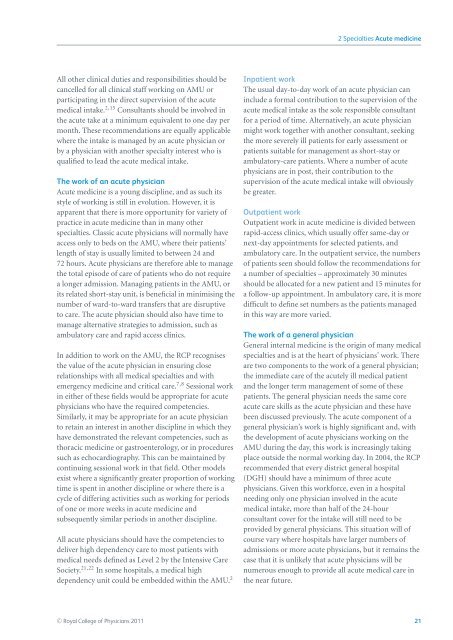Consultant physicians working with patients 5th edition - FSEM
Consultant physicians working with patients 5th edition - FSEM
Consultant physicians working with patients 5th edition - FSEM
You also want an ePaper? Increase the reach of your titles
YUMPU automatically turns print PDFs into web optimized ePapers that Google loves.
All other clinical duties and responsibilities should be<br />
cancelled for all clinical staff <strong>working</strong> on AMU or<br />
participating in the direct supervision of the acute<br />
medical intake. 2,15 <strong>Consultant</strong>s should be involved in<br />
the acute take at a minimum equivalent to one day per<br />
month. These recommendations are equally applicable<br />
where the intake is managed by an acute physician or<br />
by a physician <strong>with</strong> another specialty interest who is<br />
qualified to lead the acute medical intake.<br />
The work of an acute physician<br />
Acute medicine is a young discipline, and as such its<br />
styleof<strong>working</strong>isstillinevolution.However,itis<br />
apparent that there is more opportunity for variety of<br />
practice in acute medicine than in many other<br />
specialties. Classic acute <strong>physicians</strong> will normally have<br />
access only to beds on the AMU, where their <strong>patients</strong>’<br />
length of stay is usually limited to between 24 and<br />
72 hours. Acute <strong>physicians</strong> are therefore able to manage<br />
the total episode of care of <strong>patients</strong> who do not require<br />
a longer admission. Managing <strong>patients</strong> in the AMU, or<br />
its related short-stay unit, is beneficial in minimising the<br />
number of ward-to-ward transfers that are disruptive<br />
to care. The acute physician should also have time to<br />
manage alternative strategies to admission, such as<br />
ambulatory care and rapid access clinics.<br />
In addition to work on the AMU, the RCP recognises<br />
the value of the acute physician in ensuring close<br />
relationships <strong>with</strong> all medical specialties and <strong>with</strong><br />
emergency medicine and critical care. 7,8 Sessional work<br />
in either of these fields would be appropriate for acute<br />
<strong>physicians</strong> who have the required competencies.<br />
Similarly, it may be appropriate for an acute physician<br />
to retain an interest in another discipline in which they<br />
have demonstrated the relevant competencies, such as<br />
thoracic medicine or gastroenterology, or in procedures<br />
such as echocardiography. This can be maintained by<br />
continuing sessional work in that field. Other models<br />
exist where a significantly greater proportion of <strong>working</strong><br />
time is spent in another discipline or where there is a<br />
cycle of differing activities such as <strong>working</strong> for periods<br />
of one or more weeks in acute medicine and<br />
subsequently similar periods in another discipline.<br />
All acute <strong>physicians</strong> should have the competencies to<br />
deliver high dependency care to most <strong>patients</strong> <strong>with</strong><br />
medical needs defined as Level 2 by the Intensive Care<br />
Society. 21,22 In some hospitals, a medical high<br />
dependency unit could be embedded <strong>with</strong>in the AMU. 2<br />
2 Specialties Acute medicine<br />
Inpatient work<br />
The usual day-to-day work of an acute physician can<br />
include a formal contribution to the supervision of the<br />
acute medical intake as the sole responsible consultant<br />
for a period of time. Alternatively, an acute physician<br />
might work together <strong>with</strong> another consultant, seeking<br />
the more severely ill <strong>patients</strong> for early assessment or<br />
<strong>patients</strong> suitable for management as short-stay or<br />
ambulatory-care <strong>patients</strong>. Where a number of acute<br />
<strong>physicians</strong> are in post, their contribution to the<br />
supervision of the acute medical intake will obviously<br />
be greater.<br />
Outpatient work<br />
Outpatient work in acute medicine is divided between<br />
rapid-access clinics, which usually offer same-day or<br />
next-day appointments for selected <strong>patients</strong>, and<br />
ambulatory care. In the outpatient service, the numbers<br />
of <strong>patients</strong> seen should follow the recommendations for<br />
a number of specialties – approximately 30 minutes<br />
should be allocated for a new patient and 15 minutes for<br />
a follow-up appointment. In ambulatory care, it is more<br />
difficult to define set numbers as the <strong>patients</strong> managed<br />
in this way are more varied.<br />
The work of a general physician<br />
General internal medicine is the origin of many medical<br />
specialties and is at the heart of <strong>physicians</strong>’ work. There<br />
are two components to the work of a general physician;<br />
the immediate care of the acutely ill medical patient<br />
and the longer term management of some of these<br />
<strong>patients</strong>. The general physician needs the same core<br />
acute care skills as the acute physician and these have<br />
been discussed previously. The acute component of a<br />
general physician’s work is highly significant and, <strong>with</strong><br />
the development of acute <strong>physicians</strong> <strong>working</strong> on the<br />
AMU during the day, this work is increasingly taking<br />
place outside the normal <strong>working</strong> day. In 2004, the RCP<br />
recommended that every district general hospital<br />
(DGH) should have a minimum of three acute<br />
<strong>physicians</strong>.Giventhisworkforce,eveninahospital<br />
needing only one physician involved in the acute<br />
medical intake, more than half of the 24-hour<br />
consultant cover for the intake will still need to be<br />
provided by general <strong>physicians</strong>. This situation will of<br />
course vary where hospitals have larger numbers of<br />
admissions or more acute <strong>physicians</strong>, but it remains the<br />
case that it is unlikely that acute <strong>physicians</strong> will be<br />
numerous enough to provide all acute medical care in<br />
the near future.<br />
C○ Royal College of Physicians 2011 21

















